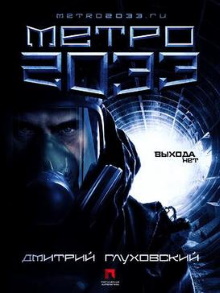
This Russian novel is probably best known as the inspiration of the video game of the same name though I have not played it as I rarely play shooters these days. It was however first made available online in the Russian language, making it an early example of the web fiction that I read so much of these days, and the author Dmitry Glukhovsky apparently started writing it at the age of 18. I decided to check it out after reading some good reviews of it and while it certainly feels like a Russian novel, I found that I don’t like it much at all.
After the use of nuclear weapons caused most of the surface world to become uninhabitable, the survivors in Moscow forge a new society underground within the tunnels of the subway system. With each subway station organized into distinct communities, they live on farmed mushrooms and pigs and are constantly threatened by strange mutants and creatures. Artyom is an orphan whose parents died when their home station was invaded by a plague of rats. He was saved as a baby and then brought up by a soldier of the VDNKh station. Now a young man, he is present when his father discusses how VDNKh is constantly being attacked by mysterious beings known as the Dark One with Hunter, a man who travels from station to station to deal with dangers that threaten the entire metro system. Hunter sees potential in Artyom who is anyway longing for adventure and gives him instructions on what to do if he fails to return from his mission to investigate the Dark Ones. When Hunter does indeed go missing, Artyom sets out on a trip to Polis, the largest city at the center of the metro system, to get help.
The beginning of the novel makes this out as something that I ought to like. I enjoyed the detailed descriptions of life in the tunnels down to their work schedules and sleeping arrangements, how their economy is based off of using bullet cartridges as currency, and how they take security seriously with there being checkpoints at every tunnel and just about everyone being armed. There is also a lot of worldbuilding with regards to the various political factions that control different parts of the metro, including Red Communists, the Neo-Nazi Fourth Reich, the Hansa trading empire and so on. Artyom’s epic journey eventually takes him just everywhere across the metro so in a way this is like a travelogue as he observes how all of these communities have developed differently and how each has troubles and dangers of their own. The only thing missing here is a decent map of the underground network as the topology of how stations are connected to one another is critical to understanding Artyom’s progress. The text does describe the connections but it’s hard to visualize them especially as all of the station names are in Russian. Artyom getting access to different maps during his trip is a key plot point and not of the information on his maps turn out to be accurate. It is a real pity that we don’t get a visual representation of the maps that he gets as he gets them. It would be incredibly immersive and would help our comprehension of his situation immeasurably.
What really irks me however is that the nature of the threats such as the Dark One are deliberately presented in an ambiguous, mysterious manner. Whether they actually possess psychic powers that assail the minds of the humans or whether the defenders are simply overcome by their own fears, much of the conflict that is described in here is psychological in nature. Artyom is also frequently prone to having prophetic dreams which may or may not be the result of external mental influence. I can appreciate that the fits of depression and the unrelenting bleakness is in keeping with the Russian national character but I dislike the lack of clarity as to what is actually real and what isn’t. Despite the early descriptions about life underground this doesn’t feel like science-fiction after all as there seems to be little interest in worldbuilding beyond these details. I find it questionable for example that staying in the metro is sufficient protection against radiation and wonder how they are doing for oxygen, technical issues which the novel doesn’t have much interest in covering.
The bleak atmosphere and sense of helplessness is exacerbated by how Artyom is a character with very little agency. He goes along with the plans of other people without much say of his own and without really understanding what is going on. His travel companions end up dead so often that Artyom himself notices the recurring pattern yet he survives again and again through no input of his own only to be pulled along by the next guide or mentor to show up. The pattern is so consistent that whenever Artyom enters a new area and a local warns him never to do something, the plot will most certainly contrive to have him end up doing it. I love Lovecraftian horror as much as anyone but this just feels so repetitive and amateurish in its formula and one can tell that it’s so that Artyom can explore all over the metro system. This isn’t scary. Instead it’s trite and tedious.
There is more action towards the end which makes the novel more entertaining but while I appreciated the confirmation that there really are flesh and blood monsters out there, this still isn’t a book that is really interested in exploring what kind of ecosystem they inhabit or what their biology is like. With prose that is pedestrian at best and unable to convey the scale of the horror that it is trying so hard for, I find little to like in this book.